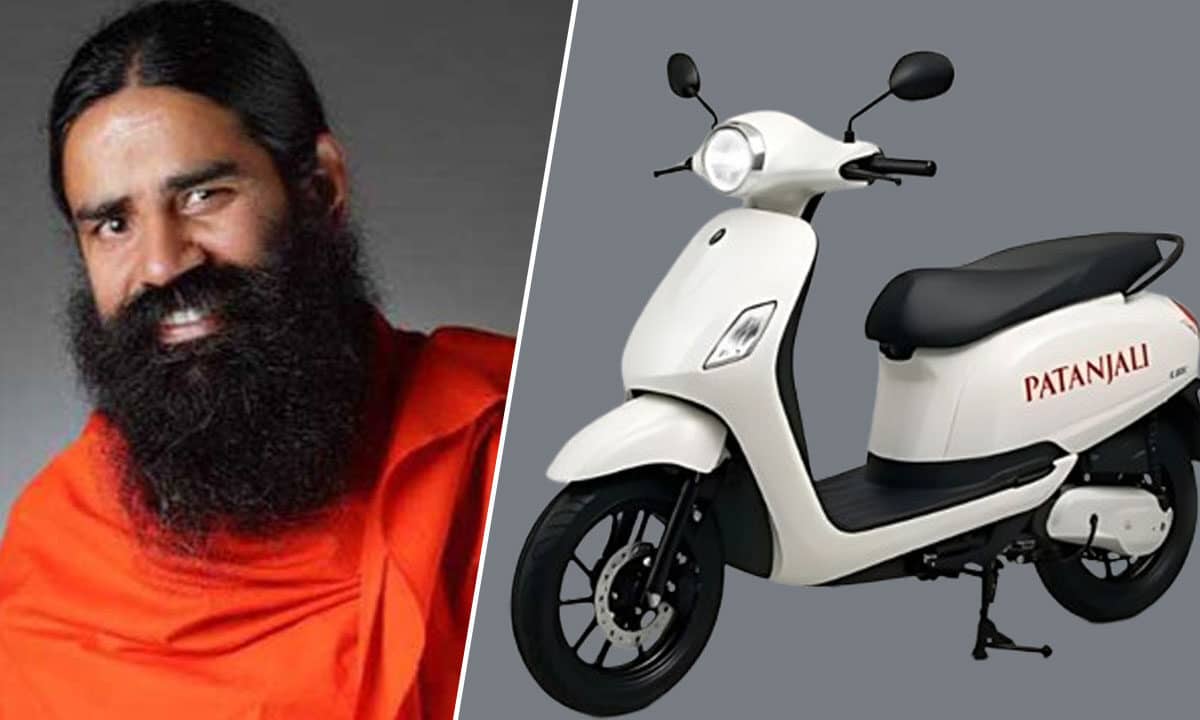Patanjali Scooter Debuts at ₹14,499 with 350 KM Range, High Range, Low Price, Big Expectations
Patanjali launches its first electric scooter at just ₹14,499, claiming a 350 KM range on a single charge. A bold entry into the EV market with high expectations.

Patanjali launches its first electric scooter at just ₹14,499, claiming a 350 KM range on a single charge. A bold entry into the EV market with high expectations.
Table of Contents
In a surprising move that has jolted India’s electric vehicle (EV) market, Patanjali, the brand best known for its Ayurvedic and FMCG products, has announced its foray into the electric two-wheeler segment. The company unveiled its debut electric scooter with a claimed range of 350 kilometers on a single charge, priced at an astonishing ₹14,499—a price point that has left the industry stunned.
Also Read: Rising Covid Cases Trigger Market Meltdown, Sensex Crashes 900 Points Amid Fresh Virus Fears
“We Want Sustainable Solutions for the Planet”
According to a Patanjali spokesperson, the venture is part of the company’s broader mission of offering eco-friendly and accessible technology. “Our vision extends beyond healthy products—we want sustainable solutions for our planet,” the spokesperson said, calling the scooter a blend of cutting-edge technology and indigenous innovation.
Features That Defy Industry Norms
Unmatched Range and Battery Innovation
The headline-grabbing feature is the 350 km range, far beyond what current electric scooters offer. Patanjali claims this is made possible through indigenously developed battery technology, optimized for Indian conditions. The removable lithium-ion battery charges in 3–4 hours from a standard outlet, offering a practical solution in areas with limited charging infrastructure.
Performance Built for Indian Roads
Despite its ultra-low price, the scooter promises a top speed of 60 kmph, a lightweight body (75–80 kg), and reliable drum brakes. Other features include:
- Digital speedometer and battery status display
- Optional smartphone connectivity
- Under-seat storage
- Weather-resistant body materials
- Color options: Spiritual White, Green Chakra, Black Dharma, and Yog Blue
The INR 14,499 Price Tag: Too Good to Be True?
Industry Skepticism and Battery Cost Concerns
Industry experts are questioning how Patanjali can offer such a high-spec scooter at just ₹14,499. “The battery alone for a 350 km range would cost more than the scooter itself,” said Rajiv Sharma, a leading automotive analyst. A battery pack capable of delivering this range would need at least 6-7 kWh, costing roughly ₹60,000–₹80,000 at current lithium-ion prices.
Analysts believe Patanjali could be subsidizing the cost or using a disruptive business model, possibly inspired by strategies used in the smartphone industry—where low device prices are supported by service ecosystems.
Rollout Plan and Sales Channels
Initial Launch in UP and Uttarakhand
Patanjali plans a phased rollout, starting with Uttar Pradesh and Uttarakhand, leveraging its existing brand presence and supply chain infrastructure. Nationwide availability is expected by the end of 2025. Pre-bookings will be available via:
- Authorized Patanjali outlets
- A dedicated mobile app
- Official website
A subscription-based ownership model may also be introduced for affordability and flexibility.
Environmental and Socioeconomic Impact
A Potential Catalyst for EV Adoption
If successful, Patanjali’s scooter could drive mass adoption of EVs, especially in rural and semi-urban regions. It could also:
- Reduce India’s carbon footprint
- Promote energy independence by cutting fossil fuel imports
- Enable new rural electrification use cases with its removable battery
Challenges Ahead
Despite the buzz, several challenges loom large:
- Technical validation of performance claims
- Regulatory approvals from agencies like ARAI
- Service infrastructure and after-sales support
- Supply chain resilience amid global component shortages
- Trust building through real-world testing and customer feedback
Disruption or Hype?
Whether Patanjali’s EV venture becomes a watershed moment or a cautionary tale remains to be seen. If the scooter lives up to its promises, it could redefine the pricing and accessibility of electric mobility in India.
As Baba Ramdev hinted, “We changed how India eats and heals—now we want to change how it moves.”
